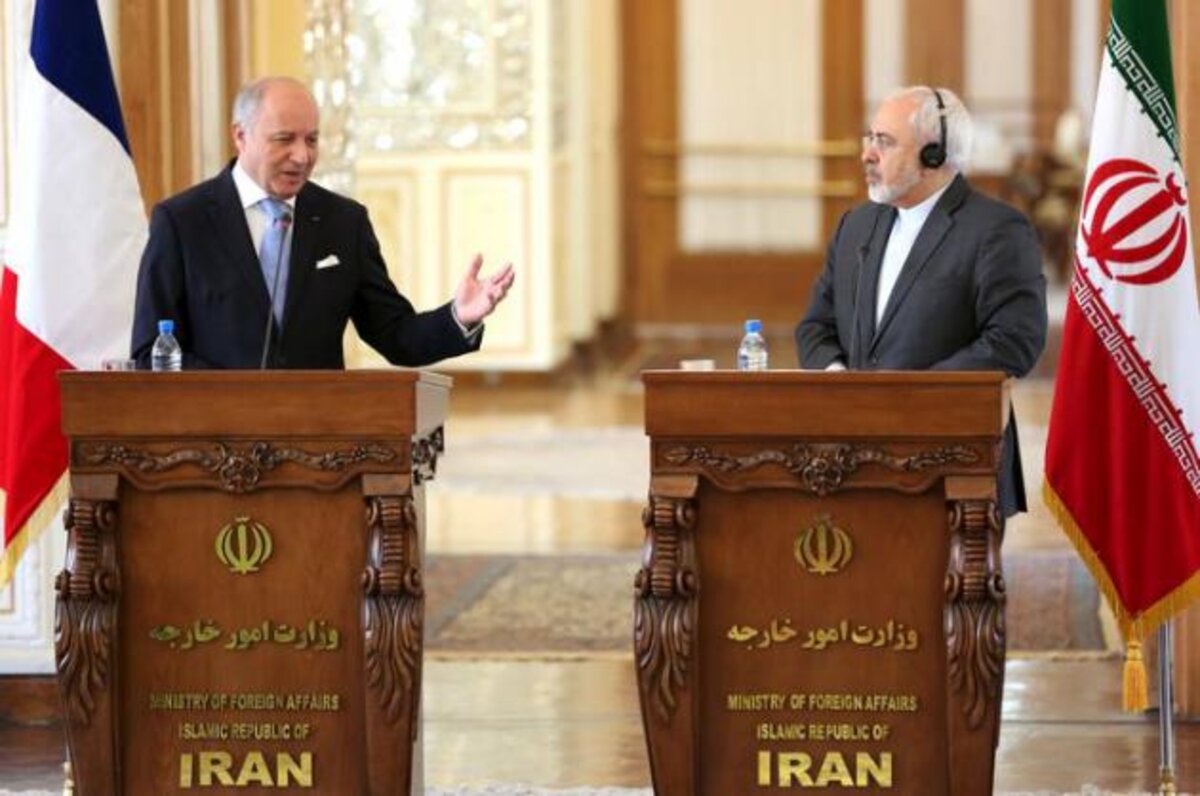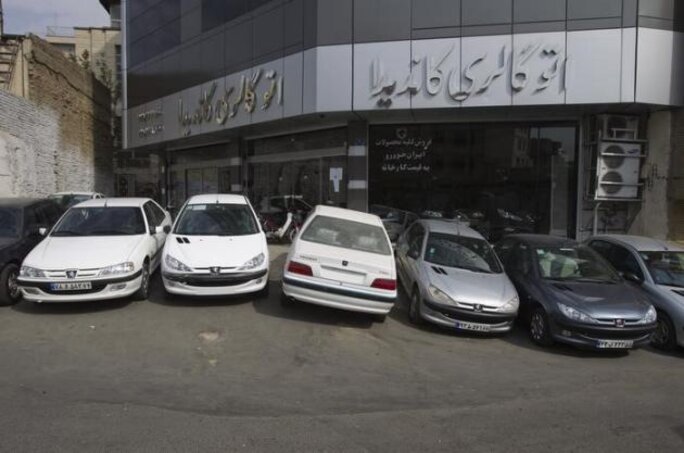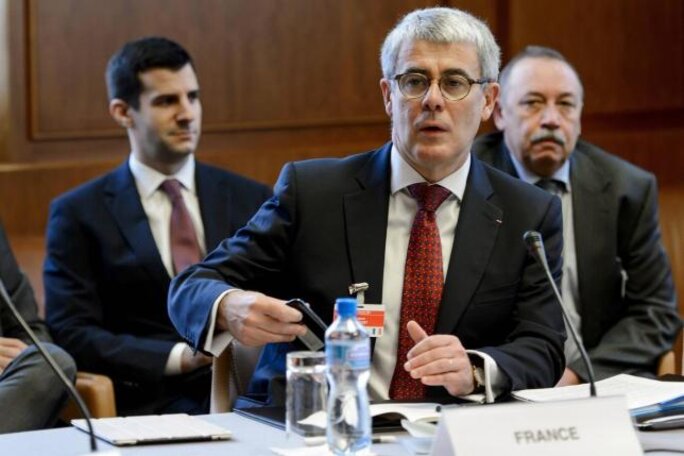Just two weeks after the signing of an agreement in Vienna on Iran's nuclear programme, the Islamic Republic's leaders pulled out all the stops to ensure that French foreign minister Laurent Fabius's visit on July 29th passed off well. This was despite the fact that his trip – the first by a French foreign minister for twelve years – followed complaints by the Iranian negotiation team about France's tough stance at those talks.
Before the visit Iranian newspapers and websites sympathetic to regime conservatives had stepped up their attacks on France, which is accused of having supported Iraq during the long war between the two countries in the 1980s. Laurent Fabius is also notorious in Iran for having been prime minister when France sent infected blood supplies to Iran in the mid-1980s. But the protesters who were at Mehrabad International Airport to await Fabius's ministerial jet, as well as those who gathered in Neauphle-le-Château street in Tehran, home of the French ambassador's official residence, were kept at a distance and quickly dispersed by riot police.
The visit was to be “political and diplomatic” in nature, aimed at turning the page on diplomatic relations between the two countries, said an official in the French foreign minister's entourage just before it took place. The foreign ministry said that business and trade issues would be dealt with in September when a hundred French business leaders brought together by the French employers organisation MEDEF will accompany Stéphane Le Foll, agriculture minister and close ally of President François Hollande, and overseas trade minister Matthias Fekl to Tehran.

Enlargement : Illustration 1

In fact, Fabius and his Iranian counterpart Mohammad Javad Zarif, who spent many long days together locked in negotiations in Vienna, used the trip to agree to hold ministerial-level meetings at least once a year, on such issues as the fight against terrorism, and the drugs trade. Acknowledging Iran as a “powerful influence in the region”, Laurent Fabius noted that “different points of view” existed between the Paris and Tehran, on Syria, Yemen and Israel, but he said that the Islamic Republic “shares with France the same attachment to peace and stability”. To mark this new chapter in Franco-Iranian relations, Fabius carried with him a letter from President Hollande inviting President Hassan Rouhani to visit France. The Iranian head of state is expected to make the visit in November.
During his brief stay Fabius also promised that Iran would be removed from France's list of countries considered potentially unsafe or risky to visit, and that the number of grants awarded to Iranian students to study in France would be increased. But overall the visit produced modest results. Having been informed that the meetings that he wanted to hold with the president of the Iranian Parliament, Ali Larijani, and with the head of the Supreme National Security Council, Admiral Ali Shamkhani, would not be possible, the French foreign minister was obliged to give his visit a more business-oriented tone. He did so by meeting oil minister Namdar Zanganeh, the minister for industry, trade and mining, Mohammad Reza Nematzadeh, the minister for highways and urban development, Abbas Akhoundi, and environment minister Masoumeh Ebtekar, who is also the country’s vice-president.
Of the subjects dealt with in these talks, the issue that seemed the most advanced involves aircraft manufacturer the European Airbus consortium, which is based at Blagnac, Toulouse, in south-west France. Iran has an ageing fleet of airliners and the country's aviation industry has been hit hard by economic sanctions. According to some sources the country needs between 300 and 500 new aircraft. The country's Civil Aviation Organization has already announced that, once Western sanctions are lifted under the Vienna agreement, it will buy 80 to 90 aircraft a year from Airbus and US company Boeing. In fact, talks on the sale of Airbus aircraft began in Paris before Fabius's visit. According to transport and urban development minister Abbas Akhoundi, who visited France in June, the current deal under discussion involves nine aircraft plus the provision of spare parts.
Fierce competition for markets
Though there are undoubted economic opportunities for France in Iran, Fabius was able to see at first hand that the competition for contracts will be fierce. For he was beaten to Tehran by German economy minister and vice-chancellor Sigmar Gabriel, who visited the Iranian capital with a delegation of business leaders just five days after the signing of the Vienna accord. Gabriel's trip was followed swiftly by the visit of Federica Mogherini, High Representative of the European Union for foreign affairs and security.
It may be that, as a report by Foreign Policy website says, for the coming years at least Europe will be in a “far better position to do business with Iran than the United States”, and that France in particular will occupy an enviable position because some of its firms – car makers Renault and PSA Peugeot Citroën and oil giant Total for example – have many years of experience operating inside the country. It is also true that Iran has been left disappointed by some of its current trade partners, such as China. But nonetheless the race to hit the Iranian jackpot will require both time and tenacity.
The first condition for success is that the International Atomic Energy Agency's (IAEA) reports show that Iran has rigorously applied the measures laid out in the Vienna agreement, thus ensuring that sanctions are gradually lifted. Given that there are three sets of sanctions – those of the United Nations, the United States and the European Union – this will be neither quick or easy. The first IAEA report is expected at the start of 2016. After that the country's banking system, with its mechanism of assurances and guarantees, needs to be made fully operational. This will also include Iran being allowed back into the SWIFT system of international payment transfers, from which it was excluded in 2012. That move will largely depend on the attitude of the Americans.
Another key point, and one on which Iran's potential trade partners are insistent, is that Tehran reforms the system for contracts with foreign companies, adapting them to the current economic situation – in essence making them more favourable for overseas businesses – and that it defines the future role of public and semi-public bodies. These include Iran's Revolutionary Guards, who control whole sections of the economy. Some of these bodies - or some of their leaders - feature on international 'black lists'. There is a risk that during the transition period that will follow the lifting of the first sanctions, foreign investors and businesses will find it hard to know the precise identity of the stakeholders behind their partners or sub-contractors.

Enlargement : Illustration 2

A further problem concerns the availability of Iranian funds that have been frozen abroad. Some 100 billion to 130 billion US dollars belonging to Iranian banks, companies or the state have been snared by cross-border sanctions. The governor of Iran's central bank, Valiollah Seif, has written to President Rouhani to warn him that only 26 billion to 30 billion dollars of these funds would be usable in the short term.
For all these reasons, and also because it will not be possible for the oil industry, currently working at 70% of its capacity, to restore its full production capacity quickly, experts inside the Iranian government estimate that it will take between a year and 18 months to be able to measure the lasting effects of the lifting of sanctions, once that process has begun.
Once the impact of the sanctions being removed is felt, the EU, whose trade ties with Iran collapsed in value from 27.8 billion euros in 2011 to 7.6 billion euros in 2014, should expect to see its business with the country rise rapidly. Current projects suggest that this trade should increase fivefold by 2018. Among French companies lining up to get involved is oil group Total, which had had a presence in Iran since 1954 and which was the last major oil company to cease operations there in 2008. The French firm, which despite stopping operations has maintained an office in Tehran since 2008, was told in June that it will be welcomed back once conditions allow. The company is unlikely to want to miss out on the chance to return to a country which has the fourth largest oil reserves on the planet, and which possesses 18% of all known natural global gas reserves.
European car makers clearly intend to make up as much lost ground as they can as quickly as possible in a market of 80 million inhabitants where Asian vehicle manufacturers have taken advantage of American and EU sanctions to establish themselves on the ground. Mercedes and Volkswagen are already in negotiations. Renault, which has never completely severed links with Iran and which plans to produce several low-cost models in the country, intends to take a stake in its local partner Pars Khodro.
However, for PSA Peugeot Citroën, which was producing 450,000 vehicles in 2011 through a local partner and which still has 30% of the market in Iran, restarting its business in the country is likely to be a little tougher. In 2012 the car maker was one of the first firms to withdraw from Iran out of respect for the sanctions but also to win the trust of executives at American car giant General Motors, with whom PSA was then in negotiation.
Diplomatic ups and downs
There are also other major markets up for grabs for French firms specialising in railway construction materials, transport infrastructure, sanitation, water management, sustainable development and the food industry in a country which lacks infrastructure and where there are record levels of pollution in the cities. Yet it is important that diplomatic ties remains good between two counties whose relations, according to foreign minister Mohammad Javad Zarif, have known “twists and turns, high points and low points”.
However, keeping those relations on an even keel will not be easy, as recent events have already shown. Just 48 hours after Laurent Fabius's visit to Tehran, comments by one of his former colleagues, Jacques Audibert, who is currently diplomatic advisor to President Hollande, disturbed the new climate of “respect” and “revival” that officially characterises relations between Iran and France. According to business news agency Bloomberg, citing US Congress members Loretta Sanchez, a Democrat, and Republican Mike Turner, who recently met him, Audibert said that while he backed the Vienna accord, if Congress voted against it “there will be some sabre-rattling and some chaos for a year or two, but in the end nothing will change and Iran will come back to the table to negotiate again and that would be to our advantage”.

Enlargement : Illustration 3

Sanchez told Bloomberg that the French official felt that in such circumstances “we could get a better deal”. In Israel, where prime minister Benjamin Netanyahu considers the Vienna accord to be “a mistake of historic proportions”, in Iran among conservatives who accuse Zarif of being too soft, even of betraying the country, and in the US Congress where many are strongly opposed to the deal, this declaration by the French president's advisor was seized on as yet further proof of President Barack Obama's supposed imprudence. Even greater importance was attached to Audibert's words because before joining the Elysée he had led the French delegation at the negotiations with Iran.
After Bloomberg's publication of these explosive comments the French embassy in Washington issued a statement in which it said it “formally denies the content of the remarks”. Jacques Audibert himself insisted in a Tweet: “I never said or suggested that a no vote from the Congress on the JCPOA [editor's note, the official title of the nuclear deal is the Joint Comprehensive Plan of Action] might be helpful or lead to a better deal”. And he told French magazine L'Obs: “Obviously I never said any such thing.” Yet two other members of Congress, Republicans Paul Cook and Tom Marino, who were at the same meeting have since issued a statement claiming that the account given by Sanchez is an accurate one.
Doubts therefore remain about the affair, based in part on Audibert's previous stance during the negotiations. Like some other French diplomats who have been involved in the nuclear negotiations, Jacques Audibert's position is close to that of American neoconservatives who, in common with Israel, consider that Iran is not a trustworthy partner, and who think that the priority in the Middle East is to increase alliances with the Hebrew state and the Gulf states. At Geneva in 2013, when he was in charge of the French delegation, Audibert blocked the wording of an interim accord which had been agreed by other negotiators but which Paris considered to be too imprecise. A new wording was agreed two weeks later.
Iran's leaders have not officially reacted to the Audibert incident. But both the Elysée and the French foreign ministry could have done without such a hitch at a time when their main aim is to see France in pole position for the potentially lucrative race for Iranian markets.
-------------------------------------------------------------------
- The French version of this article can be found here.
English version by Michael Streeter


